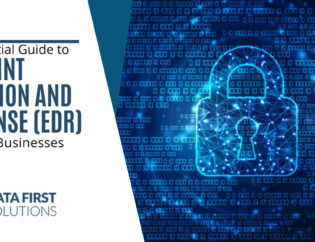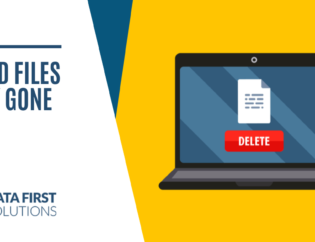
A user may start a back up for their system, and then just assume that it’s running as it should as the months go by. They never check it until a data loss incident occurs, at which time they may find it had stalled long ago, and they’re without much of their data.
The average failure rate for properly backing up all data is 75%. That may seem surprising when backup & recovery is such an important part of business continuity and ransomware protection, but unfortunately, backup mistakes are prevalent.
One of the biggest of which is not testing a backup regularly to ensure the following:
- It hasn’t run out of space,
- It hasn’t turned off
- It hasn’t stalled due to a software conflict
- It’s backing up the right data
Data loss can be costly to a Canadian business. Costs include things like emergency data recovery (if possible), lost productivity, and the cost to recreate lost documents.
The average cost per record for files lost in a data breach is approximately $196 CAD each.
At Data First Solutions, we regularly test backups for all our managed backup clients, to ensure they’re properly capturing data and that the recovery process is smooth and efficient.
What Can Go Wrong With a Backup?
Data loss can happen for a number of reasons, which is why it’s vital you have a reliable backup and recovery tool in place that is saving a copy of all your business files in the event of a data loss crisis.
Some of the common reasons that data loss occurs include:
- Accidental deletion
- Accidental overwriting
- Ransomware or malware attack
- Malicious deletion
- Hacked account
- Software syncing problem
- Hard drive crash
- Cloud service outage
There are multiple things that can go wrong with a backup, which is why it needs to be regularly tested. Some of these issues have to do with problems that can occur after backup has been initiated, and others relate to not setting a backup to correctly capture all the data that you should.
Backup Runs Out of Space
If a backup is not monitored, it can easy run out of space, and instead of all your data being backed up, only a portion of it has been captured. Once some backups run out of space, they may stop capturing new data at all, leaving you only with some of your older files.
User Turns Backup Off
Individual users may turn their backup off either intentionally or accidentally. This can happen when they’re trying to self-diagnose a performance problem on their computer and maybe they start turning off systems, and just forget to turn the backup on again.
If users edit the list of applications that begin at startup, this can also cause backups to be turned off during reboot and not restarted automatically.
Software Problem
It’s not unusual for a software glitch to cause a backup to stop running or run into writing problems when capturing data. It could be due to a new application being added to a system that conflicts with the backup process, or something else.
If you don’t regularly test your backup or have it monitored by an IT professional you can easily end up with a major issue with data not being captured properly for months.
Hardware Failure
As many as 45% of all backups fail due to hardware issues. A drive crash on a backup server or mechanical issue with an external hard drive backup could not only cause your backup to fail, they could result in lost data.
Typically, if a hard drive crash is caught soon enough, before more data is written to the disk, data can be recoverable. But if you go too long without realizing this type of backup failure, it may be too late.
Not Backing Up Cloud Data
This type of backup mishap has to do with not properly capturing all your data. Many companies use cloud applications like Microsoft 365 or G Suite, and their files are stored in those platforms.
But if you’re not backing up that data and just relying on the cloud provider to take care of it for you, you could end up with lost data and no backup copy to restore.
In the past year, 70% of surveyed companies have lost data from the cloud.
Backup is Only On-Premises
If you only use an on-premises data backup and don’t also have an off-site cloud backup, you’re leaving yourself at risk of losing all your data that’s stored on computers and your local backup.
Just one natural or manmade disaster that impacts your building could leave you without any of your files at all if your backup is located in the same physical location as your computers/server.
Never Lose Critical Data Again!
Data First Solutions has reliable data backup and disaster recovery solutions to ensure your GTA business always has a copy of all files, no matter what.
Contact us today to book a free assessment. Call 416-412-0576 or book your assessment online.









